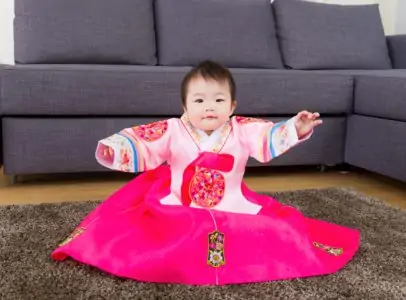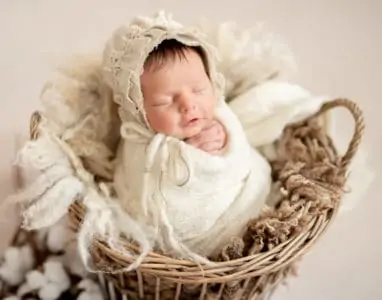Many Norwegian girl names have Old Norse roots, belonging to ancient queens, warriors, and goddesses. Whether you are looking for names as mighty as a Viking or as cute as a Nordic elf, we surely have something to pique your interest!
Next, we’ll delve into the origins, meanings, styles, and popularity of several Norwegian female names to help you select ones that are best suited for your Scandinavian princess.
105 Pretty Norwegian Names for Girls
Check out these stylish Norwegian female names for your little Viking in the making!
Aase
Aase is a less common version of Åse – traditionally spelled with the Scandinavian “å,” pronounced like the “aw” in “saw.” Norwegian dramatist Henrik Ibsen used this classic Norsk name for the mother character in his famous 1867 play, Peer Gynt.
- Origin: Norwegian
- Meaning: God
- Pronunciation: AW-seh
- Variations: Åse, Åsa
- Namesakes: Aase Nordmo Løvberg, a Norwegian opera singer.
- Popularity: Aase was prevalent in Norway in the 1920s.
Alfhild
Whimsical and strange, Alfhild is plucked from a Norse legend – belonging to a beautiful shieldmaiden who disguises herself as a man to avoid marrying her suitor, King Alf. Today, Alfhild is rare, even in Norway, with few bearers since the early 1900s.
- Origin: Norwegian
- Meaning: Elf, battle
- Pronunciation: AHLF-hild
- Variations: Alvilde
Alva
Alva is simple yet sophisticated, receiving a high ranking in our books! In Norway, it’s a feminine name meaning “elf.” Alva was traditionally masculine in the U.S., considered a variation of the Hebrew Alvah. Alva is no longer prevalent for U.S. boys – so the female version is up for grabs!
- Origin: Norwegian, Swedish, English
- Meaning: Elf, his highness
- Variations: Alvah
- Namesakes: Alva Myrdal, a Swedish diplomat, and Nobel Prize winner. Alva Belmont, an American socialite, and suffrage activist.
- Popularity: Alva is on the rise in Norway, ranked just outside the top 50 in 2020.
Amalie
Amalie is the Norwegian version of Amala – a Germanic name meaning “work.” This elegant name has been very successful in Norway, ranked in the top 100 since 1993. Amalie is a favorite among Norwegian royalty, belonging to Queen Sophie Amalie of Brunswick-Lüneburg and Queen Charlotte Amalie of Hesse-Kassel.
- Origin: Norwegian, Danish, German
- Meaning: Work, active
- Pronunciation: ah-MAH-lee-eh
- Variations: Amalia
- Namesakes: Amalie Emmy Noether, a German mathematician.
- Popularity: Amalie is a top pick in Norway, ranked 15th in 2021.
Andrine
Andrine is a feminine form of Andreas – a Greek name meaning “manly.” Despite its macho meaning, Andrine has done alright among Norwegian girl names, receiving its highest ranking of #45 in 1999. In the U.S., Andrine could be an alternative for trendier “-ine” names like Caroline, Adeline, and Adaline.
- Origin: Norwegian
- Meaning: Manly
- Variations: Andrea
- Namesakes: Andrine Hegerberg, a Norwegian soccer player.
- Popularity: Andrine was prevalent in Norway in the late 90s and early 2000s.
Anja
Anja is a popular Anya alternative in several countries. Currently, Anya is on the up-and-up in the U.S., placed 656th in 2020. Anja could be a distinctive alternative for your Norwegian princess!
- Origin: Swedish, Norwegian, Danish, Finnish, Croatian, Serbian, German, Dutch
- Meaning: Grace
- Pronunciation: AN-ya
- Namesakes: Anja Garbarek, a Norwegian singer-songwriter. Anja Rubik, a Polish supermodel.
- Popularity: Anja left Norway’s top 100 in 1997.
Anniken
Anniken is an adorable Anna-variation primarily used in Norway. If you’re a Star Wars buff, Anniken could be a feminine version of Anakin (the powerful Jedi who eventually becomes Darth Vader). If you’d rather not go to the “dark side,” Anniken could also be an attractive Aniston alternative for Jennifer fans.
- Origin: Norwegian
- Meaning: Grace, favor
- Pronunciation: ah-KNEE-ken
- Namesakes: Anniken Huitfeldt, the Norwegian Minister of Foriegn Affairs.
- Popularity: Anniken was a hip choice for Norwegian girls in the mid-90s.
Arna
Arna is both a given name and a borough in Norway, giving it a natural flair. It’s either derived from the Germanic “arn,” meaning “eagle” or the Old Norse “arinn,” meaning “hearth” or “ash.” Arna is simple, elegant, and relatively unknown – perhaps the Holy Grail of Norse names!
- Origin: Norwegian, German
- Meaning: Eagle, hearth, ash
- Namesakes: Arna Vågen, a Norwegian missionary.
- Popularity: Arna peaked in Norway in 1927.
Aslaug
A classic choice among our Norwegian names for girls, Aslaug comes from the Old Norse “áss,” meaning “god,” and “laug,” meaning “betrothed woman.” In Norse myths, Aslaug was the daughter of heroes Sigurd and Brynhildr. She won the hand of legendary Viking Ragnar Lodbrok after impressing him with her beauty and wit.
- Origin: Norwegian
- Meaning: God, betrothed woman
- Pronunciation: AHS-laug
- Popularity: Aslaug peaked in Norway in 1911.
Astrid
Astrid’s popularity is growing by the minute, making the top 500 in Norway, Denmark, Sweden, England, France, Spain, and the U.S in 2020. In English, Astrid has a celestial vibe resembling space-related terms like “astro” and “asteroid.”
- Origin: Norwegian, Swedish, Danish
- Meaning: Beautiful, god, beloved
- Pronunciation: AS-trid
- Variations: Astri, Asta
- Namesakes: Astrid Lindgren, a Swedish writer.
- Popularity: Astrid is rising in Norway, ranked 27th in 2020.
- Namesakes: Astrid Olofsdotter, a Queen of Norway.
Audny
Audny offers the total package, being simple, feminine, and unique all rolled into one. Audrey is topping the charts in several countries, making Audny the ideal alternative to staying out of the mainstream.
- Origin: Norwegian, Icelandic
- Meaning: Fortune, destiny
- Pronunciation: odd-knee
- Variations: Auðný
- Popularity: Audny was most prevalent in Norway during the 30s and 40s.
Bente
Bente is the Norwegian feminine form of Benedict – a Latin name born by an Italian monk who founded the Benedictine’s religious order in the 6th-century. Today, Bente still has strong Christian ties- a great option if you plan to raise your little angel in the church!
- Origin: Norwegian, Danish, Dutch
- Meaning: Blessed
- Pronunciation: BEHN-teh
- Variations: Benthe
- Namesakes: Bente Nordby, a Norwegian goalkeeper.
- Popularity: Bente reached its peak popularity in Norway in 1955.
Berit
Berit is cultural and lovely – a great way to pay homage to your Scandinavian heritage. It’s rarely used outside of Norway, making it a distinctive choice for a Norwegian-American. Sweet nickname options include Bee or Berry.
- Origin: Norwegian, Swedish, Danish
- Meaning: The exalted one
- Pronunciation: BEH-rit
- Variations: Brigit, Birgitta, Birgitte
- Namesakes: Berit Nesheim, a Norwegian film director.
- Popularity: Berit dropped out of Norway’s top 100 in 1976.
Birgit
Birgit is either the Scandinavian form of Bridget or the feminine version of Birger. Whatever its origins, Birgit is a tough-sounding name that isn’t “girly” in the least. If you’d prefer something gentler, try elegant Birgitta with Birgit as a nickname.
- Origin: Norwegian, Swedish, Danish, Icelandic, Finnish
- Meaning: The exalted one, help, save
- Variations: Birgitta, Birgitte, Brita
- Namesakes: Birgit Nilsson, a Swedish operatic soprano.
- Popularity: Birgit was most popular for Norwegian girls’ in the 1920s.
Bodil
Bodil is derived from the Old Norse Bóthildr, with “bót” meaning “remedy” or “penance” and “hildr,” meaning “battle.” Despite its combative meaning, Bodil is considered a friendly name, with adorable nicknames like Bo and Bodie.
- Origin: Norwegian, Danish
- Meaning: Penance, battle
- Pronunciation: BOO-dil
- Variations: Boedil, Boel, Botilda
- Namesakes: Bodil Arnesen, a Norwegian operatic soprano. Bodil Thurgotsdatter, a Danish queen.
- Popularity: Bodil was prevalent in Norway in the 1950s.
Borghild
One of many Norwegian female names from Norse mythology, Borghild, was the wife of legendary hero Sigmund. This mythical name peaked in 1904, with few bearers since. Borghild is ancient and unusual, ensuring it’ll turn heads in the 21st-century.
- Origin: Norwegian
- Meaning: Battle fortification
- Variations: Borghildr
- Popularity: Borghild dropped off Norway’s charts in the early 1900s.
Borgny
Borgny is a classic Norsk name, first used around 1390. Today it’s considered a vintage name, with few bearers since the 1930s. What’s old is often made new again, so Borgny could get another go-around soon!
- Origin: Norwegian, Icelandic
- Meaning: Stronghold, help, young, new moon
- Variations: Borgný
- Namesakes: Astrid Borgny Folstad, a Norwegian actress.
- Popularity: Borgny reached its peak in Norway in 1927, now considered a rare name.
Brynhild
In Scandinavian myths, Brynhild was a Valkyrie – a feminine spirit who chose who lived and died in battle. Brynhild can easily be shortened to Bryn, giving this Old Norse name great 21st-century potential.
- Origin: Norwegian
- Meaning: Protection in battle
- Variations: Brunhild, Brunhilda, Brunhilde, Brünhild
- Popularity: Brynhild is very uncommon in Norway, with less than 4 girls receiving the name in 2021.
Dagmar
Whether you find Dagmar oddly appealing or just odd, its power is undeniable. This mighty Viking name has been a long-time favorite in Scandinavia, Germany, and Slavic countries, even making the U.S. top 1,000 in the 1800s. Nicknames are plentiful, with Dag, Dagie, and Dasha making our shortlist.
- Origin: Old Norse
- Meaning: Day maid
- Namesakes: Dagmar Neubauer, a German Olympic sprinter. Dagmar of Bohemia, a Danish queen.
- Popularity: Dagmar reached its peak in Norway in 1900, with minimal usage today.
Dagny
Dagny means “new day” – an apt choice for a baby born in the morning! This Old Norse name fell out of use for many centuries before being revived in the late 1800s – likely due to a character in Henrik Ibsen’s 1857 play, The Viking of Helgeland.
- Origin: Norwegian, Swedish, Danish
- Meaning: New day
- Variations: Dagný
- Namesakes: Dagny Juel, a Norwegian writer. Dagny Sandvik, a Norwegian singer.
- Popularity: Dagny was common in Norway in the early 1900s, declining in popularity since.
Eira
Eira is the modernized form of Eir – the Norse goddess of healing and medicine. This mythical name is rising in England and Norway, with expectations that the U.S. will follow suit. Eira is simple, elegant, and beautiful – considered a total knockout.
- Origin: Old Norse, Icelandic, Norwegian
- Meaning: Mercy
- Pronunciation: AY-rah
- Variations: Eir
- Namesakes: Eira Lydiard, a Finnish gymnast.
- Popularity: Eira is rising in Norway, ranked 53rd in 2020.
Eivor
Eivor is a combination of the Proto-Norse “auja” (good luck) with the Old Norse “var” (spring), altogether meaning “luck in the springtime.” Eivor is typically feminine. However, it has a rugged charm that could work for either sex. Ubisoft chose Eivor for their badass Viking protagonist in Assassin’s Creed: Valhalla video game.
- Origin: Norwegian, Swedish
- Meaning: Luck in the springtime
- Pronunciation: AY-vor
- Variations: Eyvor, Eivør, Øyvor
- Popularity: Eivor is rare in Norway, with only 23 girls receiving the name in 2021.
Eldrid
Eldrid is a Norsk name rarely used outside its homeland. It’s pronounced EL-dree, not EL-drid. The phonetic spelling, Eldri, could be more user-friendly for a non-native.
- Origin: Norwegian
- Meaning: Beautiful fire
- Pronunciation: EL-dree
- Variations: Eldri, Elrid
- Namesakes: Eldrid Nordbø, a Norwegian politician. Eldrid Lunden, a Norwegian poet.
Eline
Eline is the Scandinavian form of Helen. In the U.S., Helen’s popularity has been decreasing since the 1930s. Eline could be the fresher alternative we’ve all been waiting for! Literary fans will appreciate the relation to Eline Vere, the main character in Louis Couperus’s 1998 book of the same name.
- Origin: Norwegian, Danish, Dutch
- Meaning: Light, moon
- Pronunciation: ee-LEE-nay
- Variations: Elin, Ellen, Helen, Helena, Helene
- Namesakes: Eline Powell, a Belgian actress. Eline Roebers, a Dutch chess player.
- Popularity: Eline is on-trend among Norwegian girl names, ranked 45th in 2020.
Else
Else is synonymous with Elsie – both shortened forms of Elizabeth. Else will be a challenge for English speakers since it looks like the adverb “else.” If you’re willing to overlook this, Else is an adorable name with significant meaning – a win-win in our books!
- Origin: Danish, Norwegian, German, Dutch
- Meaning: My God is an oath
- Pronunciation: EHL-seh
- Variations: Elise, Lilly, Lisa, Lise
- Namesakes: Else-Marthe Sørlie Lybekk, a Norwegian handball player. Else Lasker-Schüler, a German-Jewish poet and playwright.
- Popularity: Else dropped off of Norway’s charts in the late 1960s.
Embla
Embla’s exact meaning is unknown. Some believe it’s related to the Old Norse “almr,” meaning “elm.” In Norse myths, Embla and her husband, Ask, were the first humans (like the Norse Adam and Eve). The gods created them out of two trees.
- Origin: Norwegian, Swedish, Icelandic
- Meaning: Unknown
- Namesakes: Embla Hjulström, a Swedish actress.
- Popularity: Embla has been rising in popularity in Norway since 1993.
Emilie
Emilie is the Nordic form of the French name Émilie. Emilie is less common than Emily but more traditional than Emilee, Emileigh, or Emiley – striking the perfect balance between classic and unique.
- Origin: Norwegian, German, Danish, Swedish, Czech
- Meaning: Rival
- Pronunciation: eh-MEE-lee-yeh, EMM-mee-lee
- Variations: Emilia
- Namesakes: Emilie Flygare-Carlén, a Swedish novelist. Emilie de Ravin, an Australian actress.
- Popularity: Emilie is a top pick for Norwegian girls, ranked 5th in 2020.
Erle
Erle is the feminine form of Jarl – a title given to the highest-ranking noblemen in Viking times. In the U.S., Erle is a rare variation of the masculine Earl, most prevalent in the late 1800s.
- Origin: Norwegian
- Meaning: Chieftain
- Namesakes: Erle Galbraith, an American actress.
- Popularity: Erle has been in Norway’s top 100 since 2006.
Frida
Frida is an elegant girl named famous by 20th-century Mexican painter Frida Kahlo. While Frida is a top choice in Norway and Denmark, it’s always lingered outside the U.S. top 500 – a distinctive choice for Norwegian-Americans.
- Origin: Norwegian, Swedish, Danish, Ancient Germanic
- Meaning: Lovely, peace
- Pronunciation: FREE-dah
- Variations: Frieda, Freida
- Namesakes: Frida Kahlo, a Mexican painter. Frida Hansen, a Norwegian tapestry artist.
- Popularity: Frida is very trendy in Norway, ranked 6th in 2020.
Gerd
Gerd was a beautiful giantess and wife of the god Freyr in Scandinavian mythology. Nowadays, Gerd is considered old-fashioned, similar to Agnes or Gertrude. Perhaps this very unique, archaic name will make a comeback in the future.
- Origin: Norwegian, Swedish, Dutch, German
- Meaning: Enclosure
- Variations: Gerda
- Popularity: Gerd peaked in Norway in the 1930s before falling out of favor.
Grete
Grete is a short form of Margrethe – a Scandinavian form of Margaret, also used in Germany and Estonia. Grete is typical in Norway, with many prominent namesakes, including nine-time New York Marathon winner Grete Waitz and Grete Faremo, a former Minister of Defense in Norway.
- Origin: Norwegian, Danish
- Meaning: Pearl
- Variations: Grethe
- Namesakes: Grete Waitz, a Norwegian long-distance runner. Grete Faremo, a Norwegian politician.
- Popularity: Grete fell out of Norway’s top 100 girls’ names in 1973.
Gro
Gro is derived from the Old Norse “gróa,” meaning “to grow” – fitting for a baby girl who will “grow” into a wonderful young woman! In Norse myths, Gro was a seeress who used magic to shape the future.
- Origin: Norwegian,
- Meaning: To grow
- Pronunciation: GRU
- Variations: Gróa
- Namesakes: Gro Harlem Brundtland, a Norwegian politician.
- Popularity: Gro was prevalent in Norway during the 50s and 60s.
Gry
Gry is a perfect name for nature-lovers, meaning “dawn” in Norwegian. Several Gry’s have made history, including Gry Mølleskog, the first female ever to lead a royal court, and Gry Østvik, the first woman to win a world cup.
- Origin: Norwegian, Danish, Swedish
- Meaning: To dawn
- Namesakes: Gry Mølleskog, a Lord Chamberlain of Norway. Gry Østvik, a Norwegian biathlete.
- Popularity: Gry peaked in 31st place in Norway in 1969.
Gudrun
In Norse myths, Gudrun was the wife of Sigurd. After Sigurd’s death, Gudrun married Atli the Hun, who killed her brothers for their riches. Gudrun exacted revenge, killing Atli and burning down his hall. The Old Norse form of the name, Guðrún, is prevalent in Iceland, ranked in the top 50 since the early 2000s.
- Origin: Norwegian, Danish, Swedish, German
- Meaning: God’s secret lore
- Pronunciation: GOOD-run
- Popularity: Gudrun peaked in Norway in 1908, declining in popularity since.
Gunhild
Gunhild is a mighty name that may be better suited for a Viking warrior than a little girl! Still, Gunhild has a rugged charm that some find appealing. For modern usability, try nicknames Hilde, Gunner, or Gunny.
- Origin: Norwegian, Swedish, Danish
- Meaning: Battle
- Variations: Gunnhild, Gunhilde, Gunhilda
- Namesakes: Gunhild Rosén, a Swedish ballerina. Gunhilda of Wende, a Danish queen during the Viking Age.
- Popularity: Gunhild was most popular in Norway in the 1880s, declining ever since.
Gyda
Gyda is an old-timey name born by 11th-century Danish noblewoman Gyda Thorkelsdóttir, wife of English Lord Godwin of Wessex. Gyda and its English variation, Gytha, experienced a popularity boost during this time but eventually fell out of favor. Gyda has made a small comeback in recent years – likely due to its elegance and simplicity.
- Origin: Norwegian, Danish
- Meaning: Beautiful god
- Variations: Gytha, Githa, Gyða
- Namesakes: Gyda Anundsotter, a Swedish princess during the Viking Age. Gyda Thorkelsdóttir, a Danish noblewoman
- Popularity: Gyda was most common in Norway in the 1890s.
Haldis
Haldis is a vintage Norsk name, fashionable in the early 1900s. Strange yet attractive, Haldis could make an unconventional alternative for trendier Hailey, Hadley, or Halle.
- Origin: Norwegian
- Meaning: Stone goddess
- Variations: Halldis
- Namesakes: Haldis Halvorsen, a Norwegian opera singer.
- Popularity: Haldis peaked among Norwegian female names in 1912.
Hanna
Hanna is a classic name with a twist, giving it a leg up over timeworn Hannah. In Scandinavia, it’s a shortened form of Johanna, meaning “God is gracious.”
- Origin: Hebrew, Greek
- Meaning: Grace, God is gracious
- Variations: Hanne
- Popularity: Hanna is on-trend in Norway, placed 146th in 2020.
Hedda
Hedda is the classy, bohemian form of Hedvig – first garnered attention when Norwegian dramatist Henrik Ibsen chose it for the heroine of his 1890 play, Hedda Gabler. The name didn’t catch on in Norway until the 1970s, rising in popularity since.
- Origin: Norwegian, Swedish
- Meaning: Battle, war
- Pronunciation: HEHD-dah
- Namesakes: Hedda Berntsen, a Norwegian skier. Hedda Hopper, an American gossip columnist.
- Popularity: Hedda was ranked 12th among Norwegian girls in 2020.
Helga
A classic choice among our Norwegian female names, Helga was prevalent in Norway in the 19th and early 20th-centuries. Helga’s range from criminal to charming in pop culture, with bearers like bully Helga Pataki from Hey Arnold and benevolent Hogwarts founder Helga Hufflepuff from Harry Potter. If Helga is too dated, consider Laila, the Sami variation.
- Origin: Norwegian, Danish, Swedish, Icelandic, German, Dutch, Finnish, Hungarian
- Meaning: Holy, blessed
- Variations: Laila
- Namesakes: Helga Eng, the first Norwegian woman to receive a doctorate in Psychology. Helga Niessen Masthoff, a German tennis player.
- Popularity: Helga left Norway’s top 100 in 1958.
Hilde
In Old Norse myths, Hild was a Nordic-German Valkyrie who could revive fallen warriors in battle. Because of this, war was often called Hild’s Game. The modern version of the name is Hilde – just as powerful as its predecessor.
- Origin: Norwegian, Dutch, German
- Meaning: Battle
- Variations: Hild, Hilda
- Namesakes: Hilde Meisel, a German journalist. Hilda Ellis Davidson, an English folklorist.
- Popularity: Hilde was popular in Norway from the 1950s to 1970s.
Hulda
Hulda was the name of a seductive forest spirit in Norse myths. Her name derives from the Old Norse “hulda,” meaning “secret” or “covered.” The modern version of the name comes from the Swedish “huld,” meaning “sweet” or “lovable.” Hulda is also a variation of the Hebrew name Huldah, meaning “weasel.”
- Origin: Norwegian, Swedish, Icelandic, Hebrew
- Meaning: Secrecy, lovable, weasel
- Variations: Huld
- Namesakes: Hulda Garborg, a Norwegian writer. Hulda Crooks, an American mountaineer.
- Popularity: Hulda is very rare in Norway, with minor usage since the early 1900s.
Iben
Iben is the feminine form of Ib – a Scandinavian diminutive of Jacob. It’s a big hit in Norway, ranked in the top 100 since 2011. While Iben isn’t common outside of Northern Europe, it’s charming enough to be considered elsewhere.
- Origin: Norwegian, Danish
- Meaning: Ebony wood, supplanter
- Pronunciation: EE-ben
- Namesakes: Iben Sandemose, a Norwegian illustrator. Iben Hjejle, a Danish actress.
- Popularity: Iben’s on the rise in Norway, ranked 28th in 2020.
Ida
Ida is one of the most successful Scandinavian exports, prevalent across the globe. It may have derived from the Germanic “id,” meaning “work,” or from the Norse Goddess Iðuna, responsible for the apples of youth that prevented the gods from aging.
- Origin: German, Norwegian, Swedish, Danish
- Meaning: Work, labor, Ever-young
- Namesakes: Ida B. Wells, an American journalist and early civil rights movement leader.
- Popularity: Ida peaked in Norway in the 1990s, falling to 24th in 2020.
Inga
Inga is a mythical choice among our Norwegian names for girls, derived from Ing – the ancient name for Freyr, the god of fertility, peace, and prosperity. Inga is strictly feminine, whereas Inge is unisex – so choose whichever variation floats your boat!
- Origin: German, Norwegian, Swedish, Danish
- Meaning: Unknown
- Pronunciation: ING-ah
- Namesakes: Inga Cadranel, a Canadian actress. Inga Swenson, an American actress.
- Popularity: Inga was most prevalent in Norway in the 1880s.
Ingeborg
While Ingeborg may sound funny to you, it’s stylish in Scandinavia, belonging to several Swedish and Norwegian queens. The name went out of fashion for several decades but is back with a vengeance, ranked in the top 100 Norwegian female names since 1994.
- Origin: Norwegian, Swedish, Danish, German
- Meaning: The help of Ing
- Pronunciation: ING-eh-bawrk
- Variations: Ingebjørg
- Namesakes: Ingeborg of Norway, a Norwegian princess, and Sweden’s first female regent. Ingeborg Bachmann, an Austrian poet, and author.
- Popularity: Ingeborg ranked 75th in Norway in 2020.
Ingrid
Ingrid is classy, attractive, and exotic – a dream come true! Ing is an ancient name for Freyr, the god of fertility and peace. Its popularity is attributed to Swedish actress Ingrid Bergman, one of the most influential figures in cinematic history.
- Origin: Norwegian, Swedish, Danish
- Meaning: Ing is beautiful
- Pronunciation: ING-rid
- Variations: Inger
- Namesakes: Ingrid Bergman, a Swedish actress. Ingrid Kristiansen, a Norwegian long-distance runner.
- Popularity: Ingrid is a long time favorite in Norway, ranked in the top 50 since 1972.
Iselin
Iselin is a shortened form of several Germanic names containing “isarn,” meaning “iron.” It’s also a Norwegian version of Aisling – an Irish name meaning “dream” or “vision.” A bank and seamount surrounding Antarctica were named Iselin – giving it a natural flair.
- Origin: Norwegian, Irish, German
- Meaning: Iron, dream
- Pronunciation: is-e–LEEN
- Variations: Isleen
- Namesakes: Iselin Solheim, a Norwegian singer-songwriter.
- Popularity: Iselin was trendy in Norway in the 90s and early 2000s.
Johanna
Johanna is an innocent name with a very wholesome meaning. It comes with several ready-made nicknames, including sporty Jo, trendy Anna, or classic Hanna. Mold it to fit your daughter’s personality!
- Origin: Norwegian, Swedish, Danish, Greek
- Meaning: God is gracious
- Variations: Johanne
- Namesakes: Johanna Larsson, a Swedish tennis player.
- Popularity: Johanna is popular in Norway, ranked 64th in 2020.
Jorunn
Jorunn is a perfect option for animal enthusiasts. Unfortunately, Jorunn may sound too much like “urine” to thrive in English-speaking countries, but it could do wonderfully if you’re after something very unique!
- Origin: Norwegian
- Meaning: Lover of horses
- Pronunciation: YOR-run
- Variations: Jorun, Jórunn
- Namesakes: Jórunn Skáldmær, a Norwegian skald.
- Popularity: Jorunn left Norway’s top 100 in 1975.
Juni
Juni means “June” in several Scandinavian languages – a fitting choice for a baby girl born in the summer! June is moving up the U.S. charts, ranked #182 in 2020. Juni is adorable and more original, a total catch for a Norwegian-American.
- Origin: Norwegian, Swedish, Danish, Dutch
- Meaning: June
- Pronunciation: YOU-nee
- Namesakes: Juni Dahr, a Norwegian actress.
Kari
Kari was a big hit in the U.S. in the 70s and 80s. It’s technically a short form of Katarina or Katherine. However, some parents choose it as a stylish alternative for Kerry. Although Kari hasn’t made the U.S. charts since 2002, we suspect it’ll bounce back soon!
- Origin: Norwegian
- Meaning: Pure, each of the two
- Namesakes: Kari Wahlgren, an American actress.
- Popularity: Kari was a top 10 pick for Norwegian girls in the 40s and 50s.
Karoline
Karoline is a common Caroline variation in Scandinavia. Americans are obsessed with “K” names, with Kayla, Kylie, and Kaylee topping the charts. We suspect Karoline will be an instant fav!
- Origin: Norwegian, German, Danish
- Meaning: Man, warrior
- Variations: Karolina
- Namesakes: Karoline Fuarose, a New Zealand hip-hop artist who goes by the name Ladi6.
- Popularity: Karoline peaked in Norway in 1993 when it ranked 5th.
Katrine
Katrine is a timeless choice among our Norwegian names for girls, used in Norway since the 1300s. Try pairing it with nicknames Kat, Kate, or Katy for a modern touch.
- Origin: Norwegian, Danish
- Meaning: Pure, each of the two
- Variations: Catherine, Catrine, Katarina, Kathrine
- Namesakes: Katrine Lunde, a Norwegian handball player.
- Popularity: Katrine was common in Norway from 1970 to 2000.
Kine
Kine is a Norwegian short form of Kristine, meaning “a Christian.” It sounds hip but has a religious meaning – the perfect balance between modern and traditional. In archaic English, Kine meant “cows.” Perhaps now’s the time to make your “moo-ve” before Kine gets too popular!
- Origin: Norwegian
- Meaning: A Christian
- Variations: Kirsten, Kjersti, Kjerstin, Kristin, Stine, Tine
- Namesakes: Kine Hellebust, a Norwegian singer.
- Popularity: Kine peaked in Norway in 1986, ranking #21.
Kjellfrid
Kjellfrid’s spelling and pronunciation will be a lifelong struggle. Still, if you’re looking for something mighty, Kjellfrid could be a strong contender.
- Origin: Norwegian
- Meaning: Beautiful kettle
- Pronunciation: SHEHL-free
- Popularity: Kjellfrid hasn’t been popular in Norway since the 1930s.
Linnea
A Linnea is a beautiful dual-headed flower named after Swedish botanist Carolus Linnaeus. Linnaeus, in turn, comes from the Swedish word “lind,” for linden (lime tree). Whether your daughter’s as sweet as a flower or as refreshing as a lime, Linnea could be a fitting choice.
- Origin: Norwegian, Swedish, Finnish
- Meaning: Twinflower, lime tree
- Pronunciation: lin-NEH-ah
- Variations: Linnéa
- Namesakes: Linnéa Handberg Lund, a Danish musician.
- Popularity: Linnea ranked 32nd in Norway in 2020.
Lisbeth
Lisbeth is a short form of Elizabeth that’s so cool it’s often used solo. Fictional Lisbeth’s range from harrowing to heroic, including vengeful Lisbeth “Bette” Fischer from Honoré de Balzac‘s La Cousine Bette and powerful Lisbeth Salander from Steig Larsson’s The Girl with the Dragon Tattoo. Common nicknames include Liss and Libby.
- Origin: Norwegian, Danish, Swedish, German
- Meaning: My God is an oath
- Variations: Lizbeth, Lisbet
- Namesakes: Lisbeth Trickett, an Australian swimmer.
- Popularity: Lisbeth’s highest ranking in Norway was 34th in 1961.
Live
Live is derived from the Old Norse “hlíf,” meaning “protection.” Its modern popularity is attributed to the Scandinavian word “liv,” meaning “life” – an excellent option for a girl who will “live” life to the fullest!
- Origin: Norwegian
- Meaning: Protection, life
- Variations: Liv
- Namesakes: Liv Ullmann, a Norwegian actress.
- Popularity: Live is trendy in Norway, ranked 23rd in 2020.
Lovise
An uncommon choice among our Norwegian girl names, Lovise is a feminine form of Louis – a French/German export meaning “famous battle.” Although outdated, Lovise is quaint and lovely enough to earn our approval.
- Origin: Norwegian
- Meaning: Famous battle
- Pronunciation: law-VEE-se
- Variations: Louise
- Namesakes: Lovise was common for Norwegian women in the 1880s.
Magnhild
Magnhild is a classic Norwegian name often associated with the 13th-century saint Magnhild of Fulltofta – a pious woman who nursed the sick and provided for the poor. This was also the title of an 1877 book by prominent Norwegian author, Bjørnstjerne Bjørnson.
- Origin: Norwegian
- Meaning: Mighty battle
- Pronunciation: MAH-hilt
- Namesakes: Magnhild Haalke, a Norwegian novelist. Magnhild of Fulltofta, a Danish saint.
- Popularity: Magnhild was more prevalent in Norway in the early 1900s, now considered a rare name.
Maja
Maja is a sweet girl’s name trending across Europe, especially in Sweden, Poland, Norway, Denmark, and Hungary. In the U.S., Maya is approaching the top 50, making Maja an attractive alternative.
- Origin: Norwegian, Danish, Swedish, Slovene, German, Greek
- Meaning: Good mother
- Pronunciation: MA-yah
- Namesakes: Maja S.K. Ratkje, a Norwegian vocalist and composer. Maja Ivarsson, the lead singer of the Swedish indie band The Sound.
- Popularity: Maja entered Norway’s top 100 girl’s names in 1996, rising in popularity ever since.
Malene
Malene is a modernized form of Magdalene – associated with Mary Magdalene, a follower of Jesus who witnessed his crucifixion and resurrection. Malene was favored in Norway in the 90s and early 2000s, falling out of fashion by 2008.
- Origin: Norwegian, Danish
- Meaning: Of Magdala, tower
- Pronunciation: mah-LANE-eh
- Variations: Malena
- Namesakes: Malene Mortensen, a Danish singer.
- Popularity: Malene received its highest ranking in Norway in 1999.
Marit
Marit is one of the more traditional Norwegian girl names on our list, going back to the 15th-century. While Marit is “so last year” in Norway, it could be an intriguing alternative for Margaret in the States.
- Origin: Norwegian, Swedish, Dutch
- Meaning: Pearl
- Pronunciation: MAH-rit
- Variations: Margit
- Namesakes: Marit Bjørgen, a Norwegian cross-country skier.
- Popularity: Marit was popular in Norway from the 1940s to the 1980s.
Marte
Marte is a Norwegian variation of Martha. It’s also an Italian, Spanish, and Portuguese form of Mars, the Roman god of war. Marte was hip in the 90s but is now considered retro – perhaps a stylish fit if you like making the old new again!
- Origin: Norwegian
- Meaning: Lady
- Namesakes: Marte Høie Gjefsen, a Norwegian freestyle skier.
- Popularity: Marte was the 7th most popular Norwegian name for girls in 1991.
Mathea
Mathea is the Norwegian feminine form of Matias. It’s relatively new in Norway, ranked for the first time in 2004. Nickname options are hip Thea or sporty Matt and Matty.
- Origin: Norwegian, Greek
- Meaning: Gift of God
- Variations: Matthea
- Namesakes: Mathea Falco, a leading expert in drug abuse prevention.
- Popularity: Mathea was ranked 83rd for Norwegian girls in 2020.
Mathilde
While Mathilde is outdated in the States, it’s trendy in Europe, ranked in the top 100 in Norway, Denmark, and France. This may have something to do with the dainty French pronunciation, mah-TEEL- much cuter than the typical maa-TIHL-dah.
- Origin: French, German, Dutch, Norwegian, Danish
- Meaning: Strength in battle
- Pronunciation: mah-TIL-de, mah-TEEL
- Popularity: Mathilde has been on the rise in Norway since 1993.
Mie
Mie can be used independently or as a nickname for old-school Marie – the choice is yours! Mia’s super hot in the States, ranked in the top 10 since 2009.
- Origin: Norwegian, Danish, Japanese
- Meaning: Sea of bitterness, beloved, visible
- Pronunciation: ME-uh
- Namesakes: Mie Nielsen, a Danish swimmer.
- Popularity: Mie’s popularity is rising, ranked 58th in 2020.
Mille
Mille is sweet and straightforward – ideal if you want an authentic Norwegian name that isn’t too “out there.” If Mille is too casual, consider using it as a nickname for elegant Emilie.
- Origin: Norwegian, Danish
- Meaning: Rival
- Variations: Milly
- Popularity: Mille is trendy in Norway, ranked 64th in 2020.
Mona
Mona is beautiful and feminine, often associated with da Vinci’s masterpiece, the Mona Lisa. In Scandinavia, it’s a shortened form of Monika. Mona’s also an anglicization of the Irish Muadhnait or “little noble one” and a variation of the Arabic Muna, meaning “dreams.”
- Origin: Norwegian, Swedish, Danish, Irish, Arabic
- Meaning: One, to advise, little noble one, wishes, dreams
- Namesakes: Mona-Jeanette Berntsen, a Norwegian-Moroccan dancer.
- Popularity: Mona was a top choice in Norway in the 50s, 60s, and 70s.
Nora
Nora offers the total package, offering classic, elegant, and refined vibes. It’s derived from the Latin Honora, meaning “honor,” or from the English name Eleanor, meaning “bright light.” Famous Nora’s have a penchant for romance, including rom-com filmmaker Nora Ephron and romance novelist Nora Roberts. An alternative spelling is Norah (like singer Norah Jones).
- Origin: Norwegian, Swedish, Danish, Irish, English, German, Greek
- Meaning: Honor, bright light
- Variations: Norah
- Namesakes: Nora Ephron, an American filmmaker. Norah Jones, an American singer-songwriter.
- Popularity: Nora is very popular in Norway, ranked #1 in 2020.
Norunn
Norunn is derived from the Old Norse “nor” (north) combined with “unn,” (to wave) or “unnr,” (to love). Norunn looks a lot like “no-run” in English, making it sound super unique. Noruunn could be an attractive Noreen alternative.
- Origin: Norwegian
- Meaning: North wave, North love
- Pronunciation: NOR-oon
Oddny
Oddny is one of those Norwegian female names that are strange yet “oddly” charming. It was first used in Norway in 1854, peaking between 1935 and 1945. Oddny sounds similar to Audrey but has an unusual Norse spelling – an intriguing option for unique name enthusiasts!
- Origin: Norwegian
- Meaning: Sharp point, new
- Pronunciation: OHD-nee
- Variations: Oddný
- Namesakes: Oddný Guðbjörg Harðardóttir, an Icelandic politician.
- Popularity: Oddny is relatively uncommon in Norway, only making the top 100 four times.
Oddveig
Oddveig was a 19th-century invention derived from the Old Norse “oddr,” meaning “point of a sword,” and “veig,” meaning “strength.” Although Oddveig is a powerful name, it may be too “odd” to succeed outside Norway.
- Origin: Norwegian
- Meaning: Swordpoint, strength
- Pronunciation: OHD-vey
- Variations: Odveig
- Popularity: Oddveig peaked in Norway in 1932.
Oline
Oline is the feminine form of Ole. It first garnered attention in Norway in the 1880s but eventually fell out of favor. It was revived in the early 2000s, rising in popularity since. Oh-LEEN-ah, the Norwegian pronunciation is gorgeous but could be mistaken for OH-line.
- Origin: Norwegian, Danish
- Meaning: Ancestor’s descendant
- Pronunciation: oh-LEEN-ah
- Popularity: Oline is trending upwards in Norway, ranked 46th in 2020.
Ragna
Ragna is an old-timey Norse name that had some success in the States in the late 1800s. You can use Ragna by itself or as a shortened form for other Ragn names like Ragnhild and Ragnfrid.
- Origin: Icelandic, Norwegian, Danish, Swedish
- Meaning: Advice, counsel
- Namesakes: Ragna Nielsen, a Norwegian teacher, and feminist.
- Popularity: Ragna hasn’t been popular for Norwegian girls since the early 1800s.
Ragnhild
Ragnhild is backed by history and legend, belonging to several mystical and historical figures. One such bearer was Ragnhild Sigurdsdotter, wife of semi-historical King Halfdan the Black of Norway. Ragnhild was a magnificent queen who had prophetic dreams about her offspring’s future prosperity.
- Origin: Norwegian, Swedish, Danish
- Meaning: Battle counsel
- Pronunciation: RAN-hill
- Namesakes: Ragnhild Sigurdsdotter, a Queen of Norway.
- Popularity: Ragnhild is a long-standing favorite in Norway, ranked in the top 100 between 1880 and 2001.
Randi
Randi is a modern-sounding name with Old Norse roots, derived from “regin,” meaning “counsel” combined with “fríðr” or “beautiful.” In the U.S., Randi is a shortened form of Miranda for girls or a Randy alternative for boys – a very accessible choice for a Norwegian-American.
- Origin: Norwegian, Danish, English
- Meaning: Beautiful counsel
- Namesakes: Randi Rhodes, an American talk radio host.
- Popularity: Randi peaked in Norway in 1948, falling out of the top 100 by 1983.
Reidun
Reidun comes from the Old Norse “hreiðunn” for “home” combined with “unnr,” meaning “to wave.” Reidun sounds like an edgier Scandinavian version of Riley – ideal if you like Riley but don’t want your daughter to have the same name as half her class.
- Origin: Norwegian
- Meaning: Home, to wave
- Pronunciation: RYE-dun
- Namesakes: Reidun Seth, a Norwegian soccer player.
- Popularity: Reidun left Norway’s top 100 in 1969.
Ronja
Ronja was created by Swedish children’s author Astrid Lindgren for her 1981 book Ronja Rövardotter (Ronia, the Robber’s Daughter). Juronjaure, a lake in Sweden, inspired her. The English equivalent is Ronia.
- Origin: Swedish
- Meaning: Unknown
- Pronunciation: RON-yah
- Variations: Ronia
- Namesakes: Ronja Furrer, a Swiss model.
- Popularity: Ronja was ranked 83rd in Norway in 2020.
Runa
In Scandinavia, Runa is the feminine form of Rune – a first name derived from an ancient alphabet system used by the Vikings. Runa is also a Japanese name meaning “mighty strength” – trendy for anime characters, including Runa Yomozuki from Kakegurui and Runa Rindo from Fairy Navigator Runa.
- Origin: Norwegian, Swedish, Danish, Japanese
- Meaning: Secret lore, mighty strength
- Namesakes: Runa Førde, a Norwegian painter and illustrator.
- Popularity: Runa was a top 5 Norwegian name for girls from 1961 to 1973.
Saga
Saga is a modern option among our Norwegian names for girls, with very few bearers until the early 2000s. It’s derived from Sága – a goddess of prophecy and wisdom in Norse mythology. Saga is also an Old Norse and Icelandic word for a long story of heroic deeds.
- Origin: Norwegian, Swedish, Icelandic
- Meaning: Seeing one, story
- Pronunciation: SAH-gah
- Popularity: Saga is popular in Norway, ranked 42nd in 2020.
Sara
Sara has been a global sensation for centuries. While it’s technically Hebrew, Sara’s used extensively in Norway, permitting it to make our list of Norwegian girl names. Classic yet contemporary, Sara could give old-school Sarah a run for its money!
- Origin: Hebrew
- Meaning: Lady, princess
- Variations: Sarah
- Namesakes: Sara Ramirez, a Mexican-American actress.
- Popularity: Sara has been a typical pick in Norway since the 1970s.
Selma
In Norwegian folklore, Selma was the name of a sea serpent said to live in Lake Seljord. Despite this, Selma has been surprisingly successful in Norway, ranked in the top 100 since 2000.
- Origin: English, Norwegian, Swedish, Danish, German, Dutch, Icelandic
- Meaning: Unknown
- Namesakes: Selma Lagerlöf, a Swedish author.
- Popularity: Selma’s on the up and up in Norway, ranked 9th in 2020.
Sigfrid
In Germany, Sigfrid is a variation of Siegfried – a masculine name, meaning “beautiful victory.” The Norwegian Sigfrid has the same roots but is feminine. Girl-approved nicknames include Sig, Sigi, and Sigga.
- Origin: Norwegian
- Meaning: Beautiful victory
- Pronunciation: SIG-freed
- Variations: Sigrid, Sigfrida
- Popularity: Sigfrid fell out of favor in Norway during the 1950s but picked up again in 1992.
Signy
Signy belonged to two heroines in Norse myths: the sister of the hero Sigmund and a daughter of King Siggeir, who fell in love with Viking chieftain Hagbard. This medieval Scandinavian name could have a modern appeal, especially as a quirky alternative for Sydney or Sidney.
- Origin: Norwegian
- Meaning: New victory
- Pronunciation: SIG-nee
- Variations: Signe
- Namesakes: Signy Coleman, an American actress.
- Popularity: Signy is uncommon in Norway, with few bearers since the 1930s.
Silje
Silje is a Norwegian diminutive of Cecilia. It’s almost exclusively used in Norway, with few bearers elsewhere. When pronounced correctly, Silje is very elegant – but you’ll likely have to correct others on how to say it.
- Origin: Norwegian, Danish, Latin
- Meaning: Blind
- Pronunciation: sil-YAH
- Namesakes: Silje Nergaard, a Norwegian vocalist.
- Popularity: Silje was in Norway’s top 5 from 1982 to 1998.
Siri
Siri was a popular Norwegian girl’s name until the early 2000s. This likely has something to do with the creation of Siri – Apple’s famous virtual assistant. Siri is a cute name but may become annoying when your phone responds to you instead of your daughter!
- Origin: Norwegian, Swedish, Danish
- Meaning: Beautiful victory
- Namesakes: Siri Hustvedt, an American novelist.
- Popularity: Siri fell out of Norway’s top 100 in 2002.
Sissel
Sissel sounds like a name from a fairytale – a Scandinavian Gretel, if you will! Whimsical and strange, Sissel could be an appealing option for your Norse princess. Typical nicknames include Siss, Sisey, or Sizzey – perfect if your daughter has sisters!
- Origin: Norwegian
- Meaning: Blind
- Namesakes: Sissel Kyrkjebø, a Norwegian soprano.
- Popularity: Sissel was most common in Norway in the 1950s.
Siv
Three lettered names are all the rage, with Ava and Mia making the U.S. top 10 in 2020. Siv is just as cute as its American sisters but with a cool mystical undertone – belonging to Siv, a wife of the Norse god Thor, known for her beautiful golden locks.
- Origin: Norwegian, Swedish
- Meaning: Bride, kinswoman
- Pronunciation: SEEV
- Namesakes: Siv Jensen, a Norwegian politician.
- Popularity: Siv’s highest ranking in Norway was 20th in 1972.
Solveig
Solveig is a classic Norwegian name made famous by Henrik Ibsen’s heroine in his 1876 play, Peer Gynt. If you want an unmistakably Scandinavian name, Solveig could be a winner.
- Origin: Norwegian, Swedish, Danish
- Meaning: Strength of the sun
- Pronunciation: SOHL-vey
- Variations: Sølvi, Sylvi
- Namesakes: Solveig Gulbrandsen, a Norwegian soccer player.
- Popularity: Solveig has been a top 100 pick in Norway since the 1800s.
Storm
A fitting name for nature-lovers and nerds, Storm either comes from the English/Danish “storm” or the Old Norse “stormr.” Marvel fans will immediately think of Storm, the X-men mutant who controls weather patterns.
- Origin: English, Dutch, Danish, Norwegian
- Meaning: Storm
- Namesakes: Storm Large, an American singer and songwriter.
- Popularity: Storm is moving up in Norway, ranked 59th in 2020.
Svanhild
Svanhild is one of many Norwegian female names ripped from Norse mythology, born by the beautiful daughter of legendary heroes Sigurd and Gudrun. Despite being promised to another, Svanhild fell in love with Prince Randver (similar to a Norse Romeo and Juliet)!
- Origin: Norwegian
- Meaning: Battle of swans
- Pronunciation: SVAHN-hill
- Variations: Swanhild
- Popularity: Svanhild peaked in Norway in 1932.
Terese
Terese is the Basque and Scandinavian form of Teresa – a Spanish name developed in the 4th-century. Terese and Teresa are on their way out, with stylish Tess and Tessa taking their places.
- Origin: Norwegian, Swedish, Danish, Basque
- Meaning: Summer, to harvest
- Pronunciation: teh-REHS
- Variations: Therese
- Namesakes: Terese Nielsen, an American fantasy artist.
Tiril
Although Tiril’s exact origins are unknown, it’s commonly believed to derive from Johan Welhaven’s 1859 poem Lokkende Toner, featuring a folk heroine named Tirilil Tove.
- Origin: Norwegian
- Meaning: Unknown
- Namesakes: Tiril Christiansen, a Norwegian freestyle skier.
- Popularity: Tiril is very trendy in Norway, ranked 10th in 2020.
Tone
Tone is a newer version of Torny, both derived from Thor, the Norse god of storms. In English, Tone could be associated with a musical tone or toner (the stuff you put in your printer), with one being certainly cuter than the other!
- Origin: Norwegian, Slovene
- Meaning: New Thor, worthy of praise
- Pronunciation: TOH-neh
- Popularity: Tone received its highest ranking of 5th in 1969.
Tora
Tora is another Norwegian girl’s name derived from Thor – the Norse god of storms, strength, and fertility. Thora (an older Tora variation) was the wife to legendary Viking Ragnar Loobrok, who killed a serpent to win her hand in marriage.
- Origin: Norwegian, Swedish
- Meaning: Thor
- Variations: Thora
- Namesakes: Tora Berger, a Norwegian biathlete.
- Popularity: Tora was most common in Norway in the early 1900s.
Tordis
Tordis comes from the Old Norse Thor (the god of storms) combined with “dis,” meaning “goddess.” Tordis may sound too much like tortoise to be a “shell-ebrity” outside Scandinavia, despite its cool meaning.
- Origin: Norwegian
- Meaning: Thor’s goddess
- Namesakes: Tordis Gjems Selmer, a Norwegian singer.
- Popularity: Tordis was most popular in Norway in the late 1920s.
Tove
Although Tuva is more prevalent in Norway – placed 31st in 2020 – we think its variation, Tove, has a better shot outside the country. It’s cute, sounds similar to “cove,” and is associated with cool Swedish pop star Tove Lo. Can it get much better than that?
- Origin: Norwegian, Swedish
- Meaning: Thor is beautiful
- Pronunciation: TOO-veh
- Variations: Tuva
- Namesakes: Tove Ditlevsen, a Danish poet and author. Tove Lo, a Swedish popstar.
- Popularity: Tove fell out of Norway’s top 100 girls’ names in 1980.
Turid
Turid is a modern form of the Old Norse Þórfríðr, meaning “Thor’s beautiful.” Turid may look too much like a bathroom-related word to be a big hit, despite its excellent meaning.
- Origin: Norwegian
- Meaning: Thor’s beautiful
Unni
Unni is one of those Norwegian girl names that’s weird yet surprisingly charming. It means “new love,” perfect for the new love about to enter your life!
- Origin: Norwegian
- Meaning: New love, new wave
- Pronunciation: UHN-ih
- Namesakes: Unni Wilhelmsen, a Norwegian singer, and songwriter.
- Popularity: Unni peaked in Norway at #13 in 1954.
Vigdis
Vigdis is a mighty name belonging to Icelandic politician Vigdis Finnbogadottir, the first democratically elected president. Perhaps your Vigdis will follow in her footsteps?
- Origin: Norwegian
- Meaning: Goddess of war
- Pronunciation: VEEG-diss
- Namesakes: Vigdis Finnbogadottir, former President of Iceland.
- Popularity: Vigdis left Norway’s top 100 in 1969.
Viktoria
Viktoria is the German, Scandinavian and Greek form of Victoria – a classic name that never goes out of style. There are many nicknames at your disposal for this one, with our favorites being Vic, Vee, and Tori.
- Origin: Norwegian, Swedish, Danish, German, Russian, Greek
- Meaning: Victory
- Variations: Victoria
- Namesakes: Viktoria Komova, a Russian gymnast.
- Popularity: Viktoria peaked in Norway in 2002, declining in popularity since.
Vilde
Vilde is a shortened form of Alvilde – derived from the Old Norse Alfhildr, with “alfr,” meaning “elf” and “hildr,” meaning “battle.” This whimsical name entered the top Norwegian names for girls in the 1970s, rising in popularity since.
- Origin: Norwegian
- Meaning: Elf battle
- Variations: Alvilde
- Namesakes: Vilde Frang, a Norwegian violinist.
- Popularity: Vilde was ranked 26th in Norway in 2020.
Wenche
Wenche is the Norwegian form of Wenke – a Germanic name meaning “friend.” In some countries, famous Norwegian singer Wenche Myhre went as Wencke to avoid pronunciation complications. Even so, your little princess could wear this name proudly.
- Origin: Norwegian
- Meaning: Friend
- Pronunciation: VEN-ke
- Variations: Wenke
- Namesakes: Wenche Myhre, a Norwegian singer. Wenche Foss, a Norwegian actress.
- Popularity: Wenche was popular among Norwegian girl names in the 40s, 50s, and 60s.




































